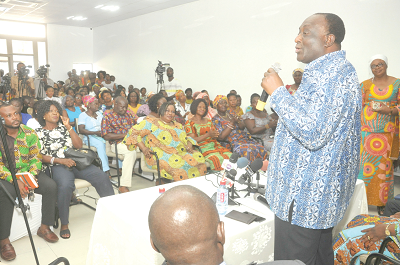
Textile importers, traders resist single corridor policy-Minister says policy not negotiable
Importers and retailers of textile prints in Accra are opposing the government's policy to use the Tema Port as the single corridor for the importation of textile products.
According to the traders, any move to adopt the single port policy would put undue financial burden on them and throw them out of business.
Advertisement
The government has announced that a tax stamp policy and the single port policy for the textile industry will start on November 15, this year.
The move by the Ministry of Trade and Industry and the Customs Division of the Ghana Revenue Authority (GRA) is meant to check tax evasion and guard against the piracy of textile designs.
That arrangement means that the Aflao Border, which has been the most patronised for the importation of textile prints, can no longer serve that purpose.
The policy was supposed to have started in July this year but was postponed to November 15 to make way for consultations with traders and other players in the textile Industry.
Fierce resistance
As part of the engagement, the Trade Ministry has been holding regional town hall meetings to educate the key stakeholders, especially the traders.
One such meeting was held in Accra yesterday that brought together importers and retailers, mainly from the central business district of Accra.
The Minister of Trade and Industry, Mr Alan Kyerematen, while addressing the traders, reiterated that the single port policy would be rolled out as planned.
However, the traders mounted a spirited defiance of the initiative, stressing that they would resist the policy.
In what appeared to be a well-rehearsed agenda, the traders, in a chorus, stated that they wanted to be allowed to import from other ports.
They also complained that the cost of imports was high and asked for a reduction in duties.
Mr Kyerematen and the President of the National Cloth Sellers Association, Mrs Christiana Laryea, had a tough time controlling the traders, who chanted intermittently to register their opposition to the policy.
Resolute stance
The minister, nonetheless, stood his ground and said the government would not relent in its effort to implement policies to salvage the local textile industry from pirates and tax evaders.
He explained that the tax stamp, the single corridor and other policies that were being rolled out in the textile industry were meant to strike a balance for local textile manufacturers, importers and consumers.
"We are determined to go ahead to implement policies that will save the textile industry.
We want to stop illegal importation and also ensure that importers pay the right duties at the port to ensure that local companies are not treated unfairly," he stressed.
Pay tolls
For his part, the Chief Executive Officer (CEO) of the Accra Metropolitan Assembly (AMA), Mr Mohammed Nii Adjei Sowah, urged traders in the various markets to pay their rent and market tolls religiously to help the assembly and the government undertake development projects that would benefit them.
He said, for instance, that the AMA would rebuild all dilapidated sheds at the Makola Market next year to improve on conditions there.
"The AMA spends about GHc60,000 a week and GHc240,000 a month on fuel alone to cart refuse from the markets. We are including the rebuilding of sheds at the Makola Market in the 2019 budget.
We need money to do all these and so if you do not pay what you are supposed to pay to the assembly and the government, it will be difficult to undertake projects to benefit you," he said.